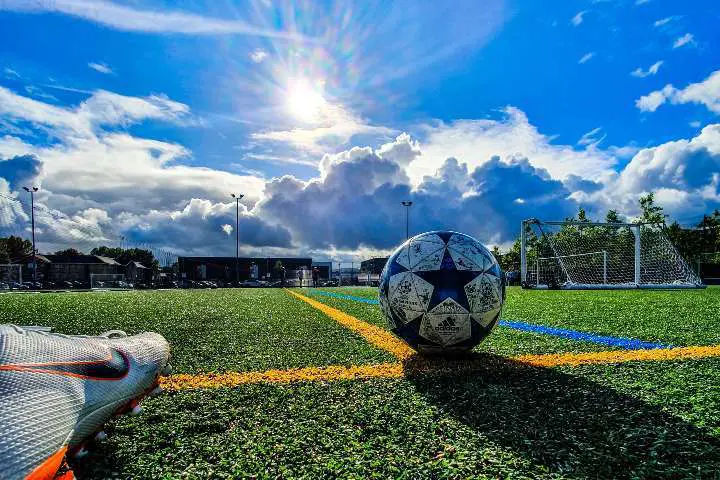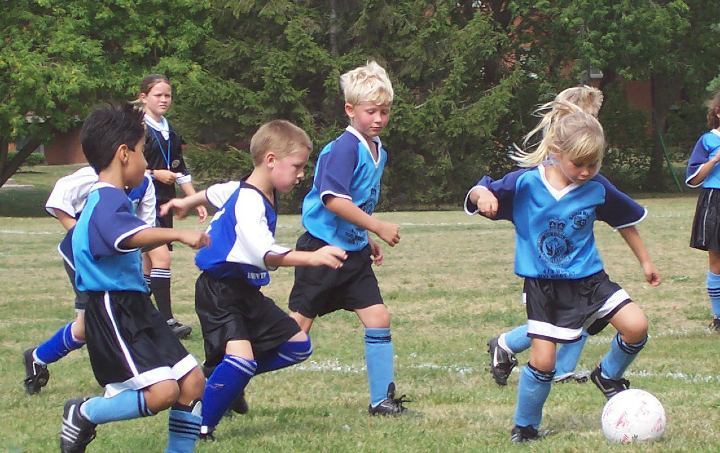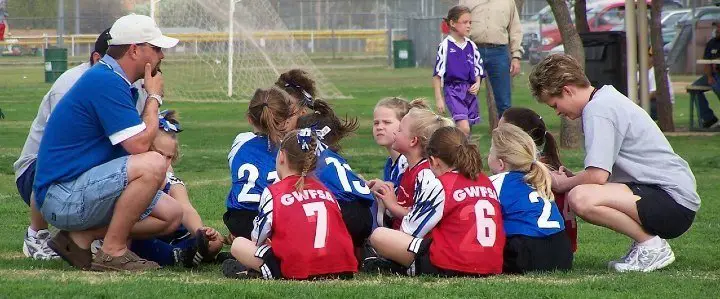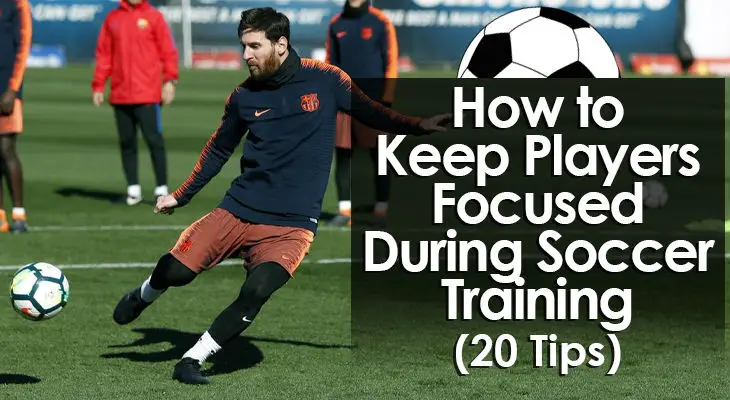How to Keep Players Focused During Soccer Training (20 Tips)
As most soccer coaches only get a few hours of training with their team each week, it’s very important that you make the most of your time together.
To best improve your players' soccer skills and abilities, you need them to give 100% focus throughout the whole duration of each training session.
While this may sound like a difficult thing to do, there are many fun and engaging ways to keep your team working on their ball control, passing, and shooting technique WITHOUT getting bored, distracted or demotivated.
Let's take a look at all of the different ways you can keep your players focused during soccer training!
Preparation and Expectations
Before you even set foot on the training ground, a lot of work should be put into preparing the session and planning exactly what the team will work on.
As you will soon see, this one task alone will massively reduces the likelihood that players will get distracted or lose focus.
Also, at the start of each and every season you should also clearly outline exactly what is expected of players in terms of their attitude and behaviour.
This will set expectations and remind players that they agreed to take training seriously and give their all to improve their skills and technique.
There is a lot you can do to keep players focused before you even make it out onto the training ground.
Let’s go through each in more detail:
1. Be clear about rules and expectations
By having an honest sit down with the squad at the beginning of the season you can lay down some ground rules and expectations in terms of their behaviour and what you expect them to bring to each training session.
Besides working to improve their skills while also enjoying their soccer, this can also include organisational things such as turning up with the right equipment, at the right time, ready to give their all out on the pitch.
The expectations laid out to them also help the players to focus as they know what training will be like and how they should behave each session.
This goes both ways...
Players should also know what they can expect from you as a coach.
2. Establish good habits
While too much repetition and routine can get monotonous and boring, youngsters often need and appreciate structure and consistency.
At training it should soon become second nature for them to work in a positive manner, together as a team, striving hard to improve their skills and get better as players.
Hard work and discipline are key to success in most walks of life, and by instilling this work ethic in the team early on you can ensure that your players will always turn up focused and ready to take training seriously.
This doesn't mean that it can't be fun, of course, and it is up to you as a coach to make it as engaging as possible.
3. Plan your training sessions
By working out in advance exactly what you want to cover in each training session, you minimise the risk of players getting distracted and losing focus.
With a clear list of the drills you want to work on in hand and timings for how long you want to spend on each of them, you’ll be better prepared which will prevent players from standing around to see what’s coming next.
One bored player will always lead to multiple bored players.
4. Always be a step ahead
Using the training session play you’ve created, you can already set up the next drills while the players are busy working on the previous one.
This means they can then seamlessly transition from one drill to another without them having to wait around.
This not only reduces the time in which they can get distracted, but also keeps the training session more engaging as they work on different skills and drills.
5. Know how to explain the drills
Key to the above is knowing exactly how to explain the drills in the clearest and most efficient manner.
This saves you time and stops the players waiting around, confused as to what is expected of them.
With a clear idea in mind of what you want from them, the players should normally happily head off to work on it, focused on getting the exercise right.

Training Sessions
There are many things you can do that will keep your players focused and working hard to improve their skills during training.
The key to this is putting on a session that covers many different skills and is quick paced and intense.
Again, a lot of planning goes into putting on the perfect training session.
Here are some ideas on how you can keep players engaged and motivated.
6. Use a variety of drills
While on occasion you will indeed need to focus on one particular aspect of the team's performance, most training sessions should be varied and encompass lots of different drills.
This helps to keep players focused as training isn’t boring and they get the opportunity to work on different parts of their game.
As we all know, doing the same thing over and over again gets repetitive and monotonous.
7. Explain the “why”
Clear communication is key to being a successful soccer coach.
You must be able to explain exactly what you’re looking for from players to prevent confusion or ambiguity as to what they are meant to do.
Explain the “why” behind why you’re running particular drills.
If there's any confusion you will often see players standing about disheartened and unsure as to what they're attempting to achieve.
It’s well worth taking the time to explain the drill or training session beforehand so that you don't waste time later on.
8. Use multi-skill drills
Setting up drills where players have to work on several different skills will help you maximise the amount you get done in the short time you have together.
For example, a passing drill can easily incorporate ball control, first touch, and off the ball movement into it.
Besides being an efficient way to get them learning different skills in different contexts, multi-skill are fun which will keep them engaged and concentrating.
9. Set up multiple drill stations
When players have to stand around waiting for their turn or aren't touching the ball much, they often start to get distracted.
A great way to avoid this, particularly if you have a large group, is to set up different drill stations and then have players rotate between them.
This gets everyone touching the ball as much as possible and working on lots of different skills at the same time.
10. Don’t spend too much time on each drill
As already mentioned, you only have a certain amount of time with your players each week which means you need to make each session count.
Besides helping you to fit in as much as possible, making sure your drills are quick paced and intense also keep players focused.
To do this effectively, you need to make sure you’re planning your training sessions in advance.

11. Know the capabilities of your team
While you obviously need to set up drills that challenge your players, it’s important you pitch them at the right level.
If you make things too complicated, players will get frustrated and start to disengage as they lose motivation.
Key to avoiding this is knowing your players' capabilities and if necessary explaining that a certain drill will be a tough challenge beforehand.
It is important to use encouraging and positive language, especially when you are pushing them and reward the players afterwards for their efforts.
12. Be flexible and change up the session if necessary
If you see that a drill isn't going quite as you planned, it’s either because you didn't explain it well or because it’s too complicated for the players.
Or, it may simply be because you have spent too long working on the same drill and the team has become bored.
When you see this happening it’s a clear indication that you need to change things up and get them working on the next drill.
Being flexible and reading the situation is another key component of putting on a fun and engaging practice session.
13. Fun competitions
A great way to regain your team's focus and attention is to throw in random small competitions when it looks like they are starting to disengage.
Whether it is practicing penalties, shooting, or keeping the ball in the air as long as possible, these small competitions are always very enjoyable for the players and generally fills them with excitement.
Once they've had their fun you can then introduce the next drill and they will almost always return to training reenergised and ready to focus again.
14. Make training competitive
By making training competitive, you immediately help your players to focus on the job at hand and give their all in each and every drill.
Knowing that you are watching how they perform and are analysing their performances, evaluating who will make it into your starting eleven at the weekend is a great way to get the team concentrated and trying their best.
15. Give positive feedback
Showering praise on the players and encouraging them at the same time also helps to let them know that you're watching and spurs them to do better.
By complimenting them when they've done well or explaining a part of their game that they could improve on, your players will see that you care and are invested in their development.

Player Relationships
While planning and preparing each training session is just as important as what each of them contains and how they are run...
Your relationships with the players and how you manage the team dynamic are just as crucial to keeping them focused.
To get the best out of your players you need to know their individual personalities, what motivates them, and what their goals are.
You also need to foster a positive team atmosphere where players happily work and compete together, all supporting one another and encouraging others to do their best.
This helps players to feel comfortable and cared for and allows them to play their best soccer in a safe and welcoming environment.
This aspect of coaching a team is absolutely key to putting on great training session that players enjoy.
16. Know your team's capabilities
In each and every team some players will be better than others.
This means that you should have different expectations for each of them in terms of how hard you can push them or how much you can ask of them.
While hard work, dedication, and respect for their teammates is a prerequisite for all players, it is just a fact that some will have better ball control, technique, and skills than others.
Knowing their capabilities allows you to praise players when appropriate, ask for more from an individual at other times, and set drills which suit all of the players on the team.
As with the rest of the tips on this list, this again helps you to keep them engaged and focused on the session.
17. Take an interest in your players
Before, during, and after training sessions you should be chatting and connecting with your players.
Seeing how they're feeling and getting to know them as people.
This helps build healthy relationships where you respect each other and take an interest in how the other person is doing.
By seeing that you care about them and are involved in their development not only as players but people too, they will respond positively and strive to do their best in training.
18. Create a positive and inclusive environment
If a player feels undervalued or unloved they are less likely to try in training and are liable to be unhappy with their role and place in the team.
While it is easier said than done, it’s up to you as the coach to make everyone feel welcome and create a positive team environment where everyone looks forward to soccer practice and can't wait to play.
This encouraging atmosphere helps players best express themselves and this in turn makes sure they are not demotivated or disinterested in training.
19. Make training fun
If players enjoy the training sessions then they are more likely to give their all and try their best.
While training should be competitive, fast paced, and intense...
It should also be as fun and engaging as possible, and it’s up to you as the coach to make sure that they are.
You shouldn’t put pressure on them as this then prevents players from showing their best and improving if they feel stressed and overwhelmed.
Again, knowing each player’s capabilities and what to expect and demand from them is key.
20. Managing behaviour
While much of this boils down to the expectations and rules you agreed upon with the team at the beginning of the season, it is also up to you to consistently apply them in the training sessions.
If players are acting out, you may have to refocus their energy and attention in a more positive manner.
While there will inevitably be times when you need to punish players, it is important you act to correct their behaviour and explain why it is unacceptable and what you expect to see from them.
With youth players they will often accept that they have been behaving poorly and accept their punishment as long as it’s fairly and consistently applied to everyone on the team.
As a coach you need to make sure you treat everyone equally as this helps keep behaviour in check and allows you to keep players focused on the training session at hand.
Conclusion
As you can see, there are many different ways you can help your players to remain focused during soccer training.
While many of them boil down to you setting high expectations at the beginning of the season and planning and preparing each session in advance, just as crucial are your relationships with the players and the team dynamic.
In addition to this, you will also need to be flexible and be able to change up the session at the drop of a hat if things aren’t working out.
While not every session ever can go perfectly, these top tips and tricks will help you make the most of your soccer practices!

